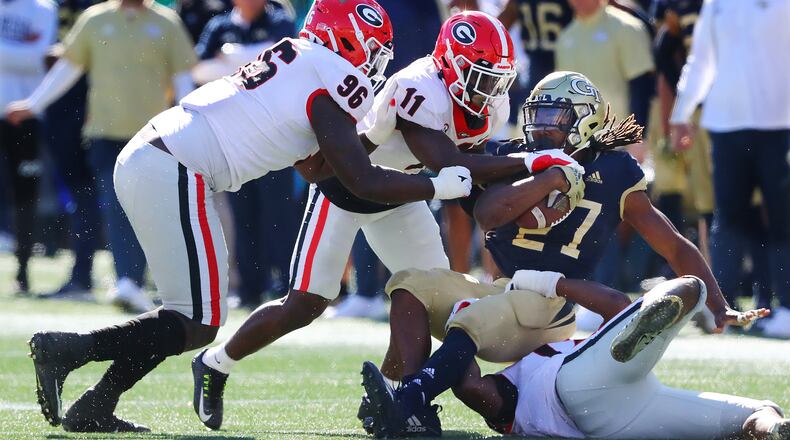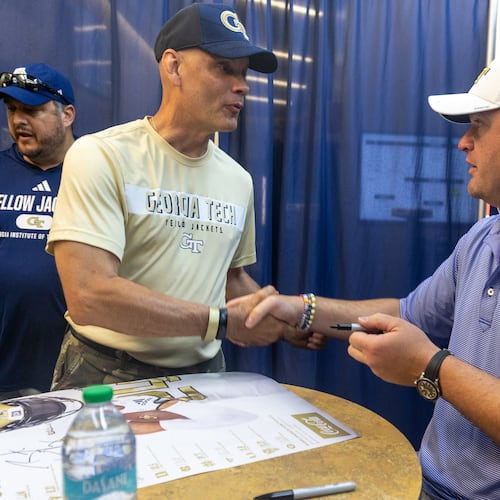With another insufficient performance, Georgia Tech completed its season at 3-9, its third consecutive three-win season, with a 45-0 loss to No. 1 Georgia Saturday at Bobby Dodd Stadium. The Yellow Jackets’ season ends with six consecutive losses, the longest since a nine-game losing streak to finish the 1994 season.
The 1992-94 tenure of coach Bill Lewis was also the last time that the Jackets recorded three losing seasons. Coach Geoff Collins offered that “nobody’s more frustrated and disappointed than myself” and resolved to take a “deep dive into every phase of our program” to solve the problems that afflict the Jackets.
Dismal day for Jackets
On a day when the Jackets needed to be at their best and receive some (or even many) breaks, things didn’t go so well for Tech. Star running back Jahmyr Gibbs, without question the team’s best player and one of the top players in the ACC, left the game in the first half and was not able to return. Quarterback Jeff Sims was again unable to play, available only in an emergency situation.
The offensive line was, again, down multiple players and had starters banged up. All of the wide receivers were said to be game-time decisions with flu-like symptoms as a flu (non-COVID) bug has spread through Tech’s campus. Of the Jackets’ regulars at the position, Adonicas Sanders was the only one who did not play (though not an insignificant absence), but the others likely weren’t all at 100%.
Shortages at defensive tackle (T.K. Chimedza and Zeek Biggers were both out) compelled Tech to play with a three-man front at times when UGA’s personnel called for a four-man line, Collins said. Little-used defensive tackles Makius Scott and D’Quan Douse played season highs for defensive snaps, according to Pro Football Focus data, while the team’s most productive tackle, Djimon Brooks, was evidently limited as his snap total was a season low by a wide margin.
Officials did not call what appeared to be a holding drawn by Tech defensive end Kyle Kennard on UGA’s first touchdown, a 25-yard touchdown pass in the first quarter. They did call a pass interference against Jackets cornerback Tobias Oliver on a third-and-3 from the Tech 39-yard line though the jostling between Oliver and Bulldogs receiver Adonai Mitchell appeared tame with no advantage gained. That penalty extended Georgia’s opening drive of the third quarter and positioned the Bulldogs for their fourth touchdown of the game and a 31-0 lead.
Even if the Jackets had been at full health and those and other officiating decisions gone Tech’s way, Georgia likely would still have won comfortably, but perhaps not 45-0.
Far, far from the top
Collins’ primary contention for progress is that the Jackets were more competitive in games they hadn’t been in their first two seasons. Notably, in six of the Jackets’ nine losses, Tech had a possession to tie or take the lead in the fourth quarter. The assertion invites some skepticism. In the five ACC losses in that category – to Clemson, Virginia, Virginia Tech, Miami, and Boston College – the Jackets were outgained on average 495-381.2, which doesn’t speak to evenly-played games.
Regardless, to the extent that may be the case, the five ACC teams in that category – Clemson, Boston College, Miami, Virginia and Virginia Tech – finished with a combined league record of 21-19. All five are bowl-eligible, but only Clemson is in the top 25. None of the other four have more than seven overall wins, and that team, Miami, appears poised to fire coach Manny Diaz. So if the Jackets are close, they’re close to being an average ACC team.
The reality that was reinforced Saturday, is that the Jackets are a long way from being competitive against the top tier of FBS. Tech undoubtedly played a tough schedule, but the Jackets fell especially hard to No. 17 Pittsburgh (52-21), No. 6 Notre Dame (55-0) and No. 1 Georgia (45-0).
Other lesser teams lost to those three, but it was Notre Dame’s most decisive win of the season, Pitt’s most decisive against power-conference competition and Georgia’s second-widest margin of victory against power-conference competition. Further, where Tech had tightened margins of defeat against other opponents, the gaps appeared to have grown against the Panthers, Irish and Bulldogs.
Said Collins, “We’ve just got to get better in every single area.”
Better defensive play
For better or worse, Tech’s defensive play appeared to be better against Georgia than it had been in recent weeks. The Jackets were cleaner in tackling. Coverage errors did not appear to be as costly. The 77-yard catch-and-run touchdown reception by UGA tight end Brock Bowers was attributable more to Bowers’ jaw-dropping speed and acceleration than any Tech flaw.
And, yet, in part because of Tech’s personnel shortages and certainly due to the Bulldogs’ advantages in talent, strength and preparation, UGA gained a staggering 9.1 yards per play, their highest single-game average against a power-conference opponent since the 2017 season (Florida, 9.4) and Tech’s highest on defense since 2016 (North Carolina, also 9.1).
“Guys played hard,” linebacker Ayinde Eley said. “There were a couple little things here and there, but I can’t really tell you was it a lot of mistakes or not just because I was out there and I haven’t seen the film.”
Bobby Dodd Stadium runs red
On top of Georgia’s domination on the field, perhaps the most impactful aspect of the game was the overwhelming number of Bulldogs fans. Attendance in 55,000-seat Bobby Dodd Stadium was 54,400, and outside of the Tech student section, the stadium was perhaps three-quarters red, if not more.
“What an incredible turnout,” UGA coach Kirby Smart said. “It felt like a home game when you looked up in the stands to see all the red. I expected it to be that way, but maybe not as much as it was.”
A further comment from Smart would likely make Collins especially wince.
“I think it’s good for recruiting,” he said. “Our recruits, they text and say, ‘Man, look at all the Georgia fans that have taken over the stadium.’”
The Tech seniors being recognized before the last game of their careers in a stadium full of the fans of their most hated rival must have been disheartening and surreal. Cornerback Tre Swilling acknowledged that “it doesn’t feel great.” Rather than be bitter, Swilling had the grace to recognize that it was a reality of playing a successful in-state opponent with a supportive fan base and also to focus on the Tech fans who did show up, not those who did not.
“The same people that were there (win or lose) being able to support us is all that we can really care about and really dwell on,” said Swilling, who after the game remained on the field to give his thanks to the student section.
It ought not be left to players who’ve invested their college decisions, bodies, energy and time to Tech, to have to rationalize playing their final home game, in Swilling’s words, “a sea of red.” Further, given those commitments and the team’s potential this season, their completing a season at 3-9 is an outcome for which Collins and his staff ultimately stand accountable.
Collins acknowledged as much Saturday, saying that “what it’s about is the guys that played their last game and I’m disappointed that I didn’t send them out the right way against two great football teams.”
Onus lies upon Collins, Stansbury
It may be that, with the development of the roster, additional gains in recruiting and through the transfer portal and the contributions of expected changes to the coaching staff, Collins eventually leads the Jackets to the heights he envisioned when he was hired in December 2018. From the perspective afforded at the end of his third season, it looks bleak.
There are promising young players, most notably running back Jahmyr Gibbs. The effort that players display in the midst of blowout losses speaks to the team-wide commitment.
“We just came into this game saying, ‘We’re going to give it all we’ve got,’” running back Jordan Mason said. “And that’s what we did today. I’m just proud of them and proud of the running backs. We came out and just hustled, did our thing. I’ve also got to give it to everybody else that blocked for us. I told (offensive tackle) Devin Cochran (Saturday), I said, ‘Man, what were y’all on today? There were lanes I’ve never seen before.’ So I told everybody I was proud of because they blocked hard today.”
Players seem genuine in their good feeling about the team environment, as well as Collins and his staff. Quarterback Jordan Yates repeated an observation he had made previously, that a visitor wouldn’t be able to determine the team’s record based on its demeanor and work ethic in the locker room and at practice.
“Of course, there’s some frustration because these aren’t the results we were looking for,” he said, “but overall, I think we always just try to look forward and just take that next step.”
That commitment only accentuates the disappointment of this season and especially losing the last two games by a combined 100-0. If players had good attitudes, worked hard and did what they were asked to do (or more), and had made improvements from the previous season, then a third consecutive three-win season – even if progress was made – does not speak well of the coaching given to them. The anger and frustration of fans, alumni and donors has been widespread and will likely result in another attendance drop next season. But it’s ultimately Yates, Mason and their teammates to whom Collins and athletic director Todd Stansbury owe their best to maximize their potential.
About the Author
Keep Reading
The Latest
Featured



